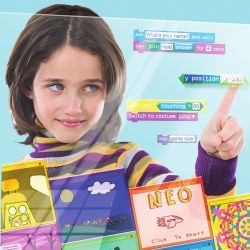 In der Novemberausgabe der Communications of the ACM ist die Programmiersprache Scratch (Biblionetz:w02030) Titelthema. Unter dem Titel Scratch: Programming for All (Biblionetz:t09978) erläutern die Entwicklerinnen und Entwickler von Scratch die Ziele und Kernüberlegungen, die hinter der Programmierumgebung für Kinder und Jugendliche stecken.
Der Artikel betont die Bedeutung des Programmieren-Könnens für das Verständnis und Gestaltungsmöglichkeit in einer digitalen Welt. Diese Idee ist keineswegs neu, aber der Artikel enthält einige sehr schöne Aussagen in prägnanter Form, die sich wunderbar als Zitate eignen:
In der Novemberausgabe der Communications of the ACM ist die Programmiersprache Scratch (Biblionetz:w02030) Titelthema. Unter dem Titel Scratch: Programming for All (Biblionetz:t09978) erläutern die Entwicklerinnen und Entwickler von Scratch die Ziele und Kernüberlegungen, die hinter der Programmierumgebung für Kinder und Jugendliche stecken.
Der Artikel betont die Bedeutung des Programmieren-Könnens für das Verständnis und Gestaltungsmöglichkeit in einer digitalen Welt. Diese Idee ist keineswegs neu, aber der Artikel enthält einige sehr schöne Aussagen in prägnanter Form, die sich wunderbar als Zitate eignen:
It has become commonplace to refer to young people as "digital natives" due to their apparent fluency with digital technologies. Indeed, many young people are very comfortable sending text messages, playing online games, and browsing the Web. But does that really make them fluent with new technologies? Though they interact with digital media all the time, few are able to create their own games, animations, or simulations. It's as if they can "read" but not "write."
Sogenannte digital natives (Biblionetz:w01839) sind also aus Sicht des Scratch-Entwicklungsteams trotz eventuell vorhandener Web 2.0 Virtuosität eigentlich passiv Konsumierende: Sie nutzen nur bestehende Programme und Services, statt diese selbst (weiter) zu entwickeln.
Das Scratch-Team sieht deshalb Programmierkenntnisse (Biblionetz:f00114) als notwendigen Teil einer digital fluency :
As we see it, digital fluency requires not just the ability to chat, browse, and interact but also the ability to design, create, and invent with new media, as BalaBethany did in her projects. To do so, you need to learn some type of programming. The ability to program provides important benefits. For example, it greatly expands the range of what you can create (and how you can express yourself) with the computer. It also expands the range of what you can learn. In particular, programming supports "computational thinking," helping you learn important problem-solving and design strategies (such as modularization and iterative design) that carry over to nonprogramming domains. And since programming involves the creation of external representations of your problem-solving processes, programming provides you with opportunities to reflect on your own thinking, even to think about thinking itself.
Neben Designprinzipien und Grundsatzüberlegungen bietet der Artikel auch Zukunftsaussichten. Wohin soll Scratch gehen?
We plan to keep our primary focus on lowering the floor and widening the walls, not raising the ceiling.
[...]
As we develop future versions, our goal is to make Scratch even more tinkerable, meaningful, and social. With our Scratch Sensor Board (http://info.scratch.mit.edu/Sensor_Boards External Link), people can create Scratch projects that sense and react to events in the physical world. We are also developing a version of Scratch that runs on mobile devices and a Web-based version that enables people to access online data and program online activities.
Cool: Ein Scratch auf mobilen Geräten und ein Scratch, das im Internet Daten austauschen kann. Sozusagen Scratch für mobile learning und Scratch für Web 2.0.
Das Scratch-Entwickler-Team sieht die Herausforderung weniger bei der Technik, sondern eher im Bereich Bildung und Gesellschaft:
Probably the biggest challenges for Scratch are not technological but cultural and educational.10 Scratch has been a success among early adopters, but we need to provide better educational support for it to spread more broadly.
[...]
There needs to be a shift in how people think about programming, and about computers in general. We need to expand the notion of "digital fluency" to include designing and creating, not just browsing and interacting. Only then will initiatives like Scratch have a chance to live up to their full potential.
Lesen! und Los-Scratchen!
Richtig lesen können sie auch nicht... http://www.zeit.de/2009/47/DOS-Analphabeten?page=all -- TorstenOtto - 16 Nov 2009
